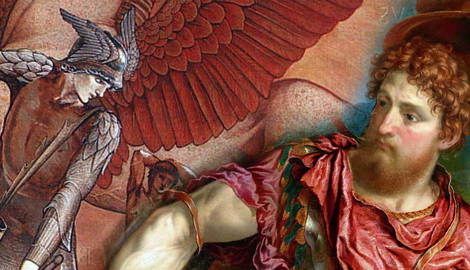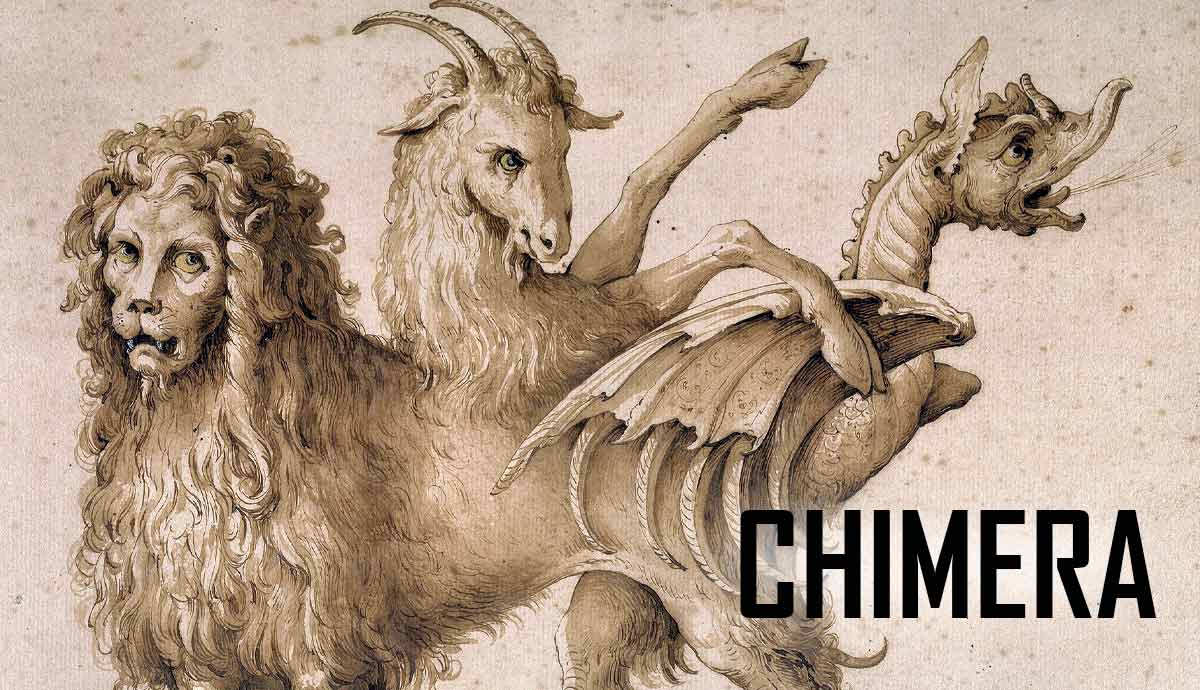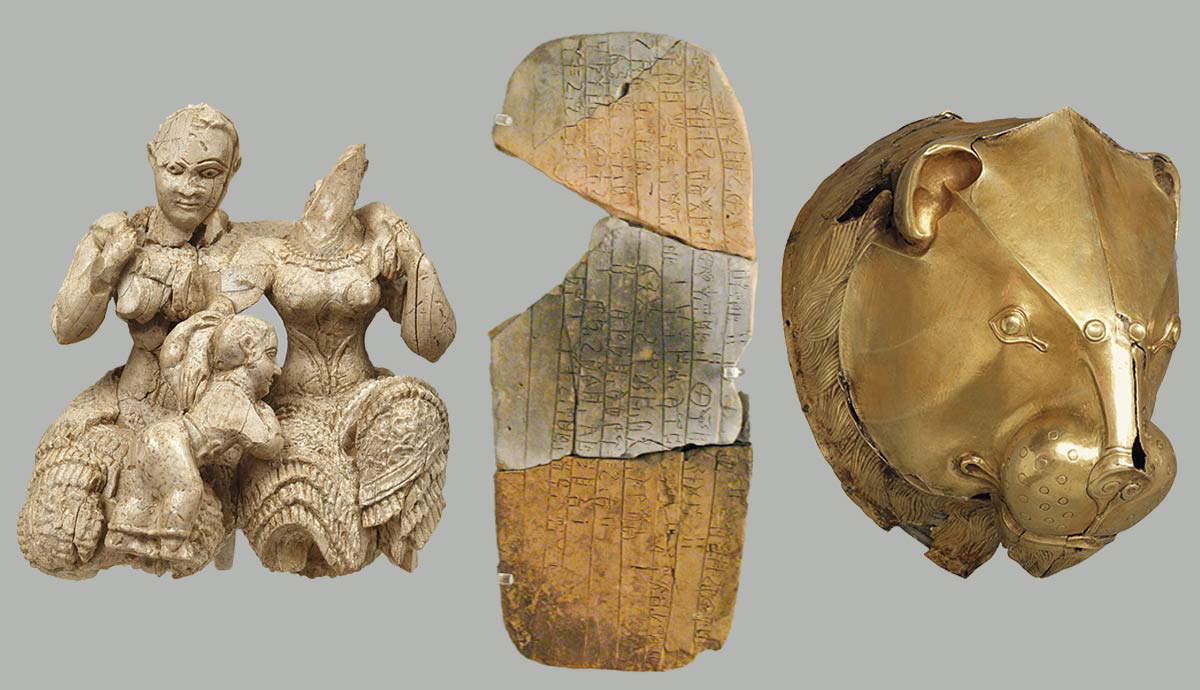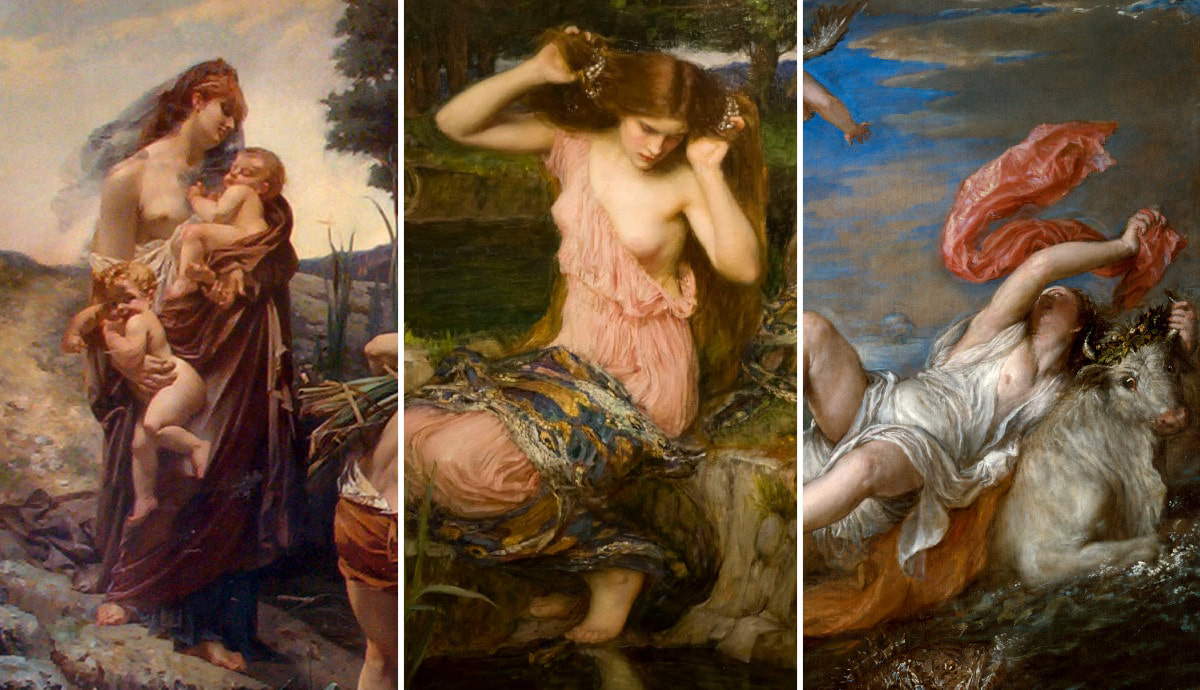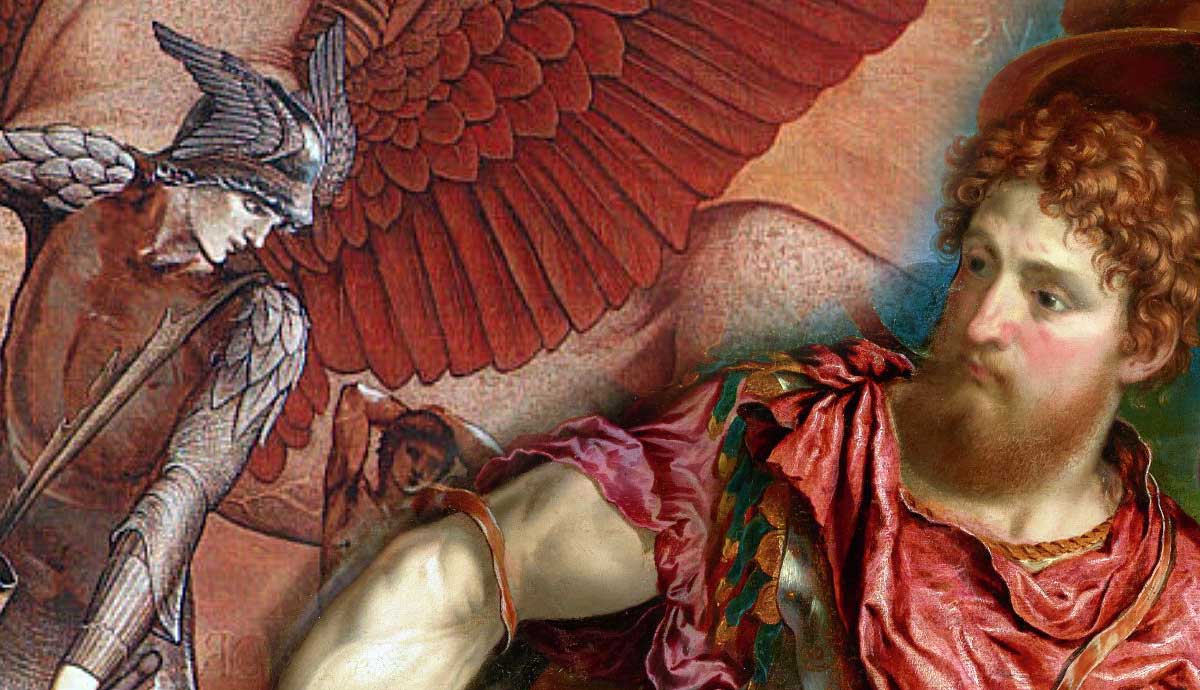
Perseus, the son of Zeus, was abandoned by his grandfather, King Acrisius, due to a dark prophecy. He and his mother, Danae, were saved by a fisherman named Diktys on the island of Seriphos. However, Diktys’s brother, King Polydectes, desired to marry Danae and devised a plan to rid himself of Perseus by sending him on an impossible quest to behead the Gorgon Medusa. With the help of the gods, Perseus completed this daunting task and rescued a princess along the way. Discover the epic tale of the hero Perseus.
The Golden Shower

In Greek mythology, the birth of a hero often begins with Zeus’s lust. Zeus frequently disguises himself as a mortal or an animal to seduce his romantic partners. In the story of Perseus, Zeus takes on one of his most unusual disguises to pursue Perseus’s mother, Princess Danae.
Perseus’s grandparents, King Acrisius of Argos and Queen Eurydice had only one daughter, Danae. However, Acrisius longed for a son to inherit his kingdom and consulted the Oracle of Delphi about the possibility of having a male heir. The Oracle informed Acrisius that he would never have the son he desired. Instead, she revealed that Danae would eventually have a son, whom the oracle warned was destined to kill Acrisius.
Acrisius’s thoughts shifted from securing an heir to self-preservation, fearing the threat of his unborn grandson. At this time, Danae was not pregnant, but motivated by familial love and the fear of blood guilt, Acrisius could not harm her. In ancient Greek society, certain crimes, especially murdering a family member or blood guilt, were considered so heinous that they could taint one’s soul and invoke the wrath of the vengeful Erinyes, who would drive the perpetrator to madness. To avoid this fate, Acrisius constructed a bronze tower to safeguard himself and isolate Danae from potential suitors.

Men were forbidden to enter the tower, and Danae was forbidden to leave, but Acrisius provided her with every comfort he could offer. However, news of the beautiful princess trapped at the top of the tower quickly spread and even reached the gods on Olympus. When Zeus learned of Danae’s predicament, he became infatuated with her. Danae was known as one of the most beautiful women in the realm, and the idea of making love to a woman trapped in an impenetrable tower excited him just as much as her beauty did. Zeus relished a challenge. His usual transformation tricks would not be effective, so he devised a brilliant and unconventional plan to reach the imprisoned princess.
One night, Zeus descended from Olympus to the city of Argos, transforming himself into a shower of gold that fell upon a bronze tower. In some versions of the story, this golden shower is described as gold dust, while in others, it is depicted as golden rain that poured through the roof of the tower and landed in the lap of Danae. Danae realized that this unusual golden shower was an act of seduction from Zeus and understood that she had become pregnant. She was able to hide her pregnancy from her father until after she gave birth, at which point Acrisius heard the cries of a baby coming from the tower.
Abandoned at Sea

Acrisius found himself in a challenging predicament. He believed Danae’s claim that Zeus was the father, as only a god could have broken into the impenetrable tower. Acrisius hesitated to harm the child, fearing the wrath of the Erinyes and the vengeance of Zeus.
Instead, he decided to seal Danae and Perseus in a wooden chest and abandon them at sea. The king reasoned that this action did not constitute harm, as it would leave their fates to chance. If they perished, it was the will of the gods; if they survived, Perseus would be far away, unable to threaten him. Danae and Perseus were set adrift, but Zeus aided them by having Poseidon guide their chest to the island of Seriphos.
On the shores of Seriphos, Danae, and Perseus were liberated from their wooden prison by a local fisherman named Dictys, the brother of the island’s king, Polydectes. Unlike his cruel brother, Dictys was a kind man who took Danae in and helped her raise Perseus.
The Wedding Gift

As time passed, Polydectes learned of his brother’s beautiful new houseguest. Danae’s beauty never faded, and Polydectes made numerous attempts to seduce her, but she always rejected him. Over the years, Perseus grew into an athletic youth, becoming strong enough to defend his mother from Polydectes’s unwanted attention.
Despite Perseus’s efforts, Polydectes remained resolute and devised a plan to rid himself of the annoying youth. He declared his intention to marry Hippodamia, daughter of King Oenomaus of Pisa. An oracle warned Oenomaus that he would be killed by his son-in-law, prompting him to challenge any suitors to a chariot race. Oenomaus was the best charioteer in the lands, and only those who could defeat him would win Hippodamia’s hand; failure meant beheading. Many contenders tried, but Oenomaus defeated them all, keeping the oracle’s prophecy at bay.

Polydectes hosted a banquet, asking guests to bring a horse as a wedding gift to help him defeat Oenomaus. Perseus, raised in a poor household, felt ashamed and could not afford a horse. When he asked for an alternative gift, Polydectes demanded the head of Medusa. Unsure of what a Medusa was but eager to regain his honor, Perseus accepted the challenge, not realizing he had fallen into a trap. Slaying the Gorgon Medusa was deemed impossible, and Polydectes was confident Perseus would fail, leaving his mother vulnerable to the king’s advances.
Help of the Gods

Perseus quickly realized the difficulty of the quest which he had impulsively accepted. Before he could confront Medusa, he needed to locate her, but no one could tell him where she was. His quest seemed to stall before it had even begun, and without any leads, Perseus prayed to the gods for assistance. Zeus heard his plea and sent his children, Athena and Hermes, to get their half-brother back on track.
Athena and Hermes appeared to Perseus and whisked him away from Seriphos to the legendary Garden of the Hesperides, nestled on an island at the eastern edge of the world. The Hesperides were the beautiful nymphs of the evening, associated with the west and sunsets, responsible for guarding the grove of golden apples that belonged to the goddess Hera. Ladon, the immortal, hundred-headed dragon, aided them in this task. Under the vigilant protection of the Hesperides and Ladon, the garden gained a reputation among the Olympians as a secure place to store their most valuable treasures.

The Hesperides guided their guests through the orchard of golden apples to the treasures of Olympus. Athena and Hermes presented several gifts to Perseus to help him defeat Medusa. Athena gave Perseus a shield with a polished surface, instructing him to polish it to a mirror finish every day. On behalf of their father, Zeus, she provided Perseus with an unbreakable, adamantine sickle sword called a harpe. Hermes gave Perseus winged sandals that allowed him to fly and presented him with Hades’s helmet of invisibility on behalf of their uncle in the Underworld. Finally, the Hesperides gifted Perseus a magical satchel called the kibisis to store Medusa’s head safely.
Perseus was now equipped with some of the most powerful items from Olympus. However, he still did not know where to find Medusa. Athena and Hermes informed Perseus that they could not reveal Medusa’s location; the gifts they had given him were already stretching the limits of the divine aid that gods could provide to a mortal. They advised him to seek out a trio of sisters known as the Graeae, who held the secrets to locating Medusa.
In some versions of the myth, Athena and Hermes instruct Perseus to locate the Graeae first. By doing so, he learns the location of the Hesperides, who then tell him where to find the Gorgons and provide him with the magical equipment needed to defeat Medusa.
The Grey Ones

The Graeae, also known as the Grey Sisters, were a trio of haggard, grey-haired elderly women who represented the white foam of the sea. While some accounts claim there were only two sisters, most sources record three, naming them Pemphredo (she who guides the way), Enyo (the warlike one), and Deino (the terrible one), though some versions replace Deino with Persis (the destroyer). The Graeae are depicted as old, withered crones, and a unique feature of the sisters is that they share a single detachable eye and tooth among them.
The Graeae were the daughters of the sea deities Ceto and Phorcys and close sisters of the Gorgons. Although the Graeae were generally harmless, they held an important secret that they protected dearly: the location of the Gorgons.

Perseus used Hermes’s sandals to fly to the island of Cisthene in the east, where the Graeae lived. When he confronted the Grey Sisters to ask for the location of the Gorgons, they refused to answer him. Despite his pleas, the sisters remained silent, passing their shared eye and tooth among themselves to get a better look at their uninvited visitor.
Growing impatient, Perseus snatched the Graeae’s eye and tooth as they passed them to each other. He refused to return them until they revealed the location of the Gorgons. Now blind and toothless, the Graeae quickly agreed and told Perseus that the Gorgons lived in a cave not far from where they were. Honoring his promise, Perseus returned the eye and tooth to the Graeae before flying to the home of his prey, the Gorgon Medusa.
The Gorgon Medusa

Medusa and her younger sisters, Stheno and Euryale, were the fearsome Gorgons, daughters of the sea deities Phorcys and Ceto. This trio of monstrous, winged women possessed brass talons, boar tusks, and serpents for hair. Their large bulging eyes held a deadly power: the ability to turn a person to stone with just one glance. While some claim that Medusa possessed only the power to turn people to stone, she was distinct from her sisters in many ways.
Medusa was the only mortal in her family and, unlike her sisters, did not start her life as a Gorgon. She was once a beautiful maiden whose beauty captivated Poseidon, making him infatuated with her. In some versions of the myth, Medusa and Poseidon were lovers before the fateful night that changed her life forever. However, in most accounts, Poseidon raped Medusa while she was visiting one of Athena’s sacred temples.
Engaging in sexual intercourse in the temple of the virgin Athena, whether consensual or not, was viewed as an unforgivable act of blasphemy. Athena, unable to punish Poseidon—a fellow Olympian—for assaulting Medusa in her temple, directed her anger towards the victim, Medusa. As a result, Athena transformed Medusa into a Gorgon, condemning her to be hunted by men. Some later accounts suggest that Medusa angered Athena by claiming to be more beautiful than her in an attempt to justify her harsh punishment.
Perseus and Medusa

When Perseus arrived at Medusa’s cave, he found a macabre garden of statues, all frozen in various poses of terror and confusion. Perseus waited until nightfall, hoping that Medusa and her sisters, Stheno and Euryale, would be asleep when he launched his attack. He polished Athena’s shield to pass the time until it gleamed like a mirror. He knew looking directly at Medusa would turn him to stone, but he could avoid her deadly gaze by watching her reflection in the shield. Gazing at his reflection in the mirror, Perseus practiced swinging his sword, getting accustomed to the inverted motion reflected at him to prepare for his attack.
Just after midnight, he donned all the gifts given to him by the gods, except for Hades’s helmet, as he could not see his reflection in the shield while invisible. Fully prepared, he descended, flying low to avoid making noise with his footsteps.
Perseus quietly entered Medusa’s cave, flying backward and using Athena’s mirrored shield for guidance. Soon, he spotted Medusa sleeping alone among her family of stone statues, visible through the reflection in the mirror. Perseus carefully approached the slumbering Medusa, keeping his back turned as he drew his father’s sword. Gazing at the shield, Perseus swung his blade, severing the neck of the sleeping Medusa with one decisive blow.

As the sword sliced through her neck, Medusa opened her eyes and unleashed an ear-piercing scream, her bulging eyes desperately searching to petrify her attacker. In her final moments, Medusa only saw the back of a man’s head and her reflection in a shining shield as her head was cut free from her body. Still staring at the shield, Perseus reached out and grabbed Medusa’s head, clutching the still-writhing snake hair, and plunged it into the magical satchel, safely sealing away Medusa’s petrifying eyes.
Perseus had little time to celebrate; Medusa’s final cries had awakened her sisters, who came charging in looking for her. However, before they could reach him, Perseus donned Hades’s helmet, turning invisible and avoiding the Gorgons’ notice. He then flew out of the cave as fast as Hermes’s sandals could take him.
If Perseus had dared to stay, he would have witnessed something as unusual as his divine conception. From the stump of Medusa’s neck, fully formed twin brothers emerged: the white-winged horse Pegasus and the giant Chrysaor wielding a golden sword. It turned out that Medusa had been pregnant with Poseidon’s twin sons throughout her entire life as a Gorgon. Upon her death, with the help of Perseus’s sword, she could finally bring her sons into the world. Later versions of the myth suggest that Perseus and Pegasus would join forces for the rest of the hero’s adventure.
Perseus and Andromeda

During his flight back to Seriphos, Perseus passed through Ethiopia, where he observed a frightening scene: a beautiful naked woman chained to a rock as a sea monster approached her, ready to devour her. Ethiopia was ravaged by a destructive sea monster named Cetus at the time. The beast’s rampage was triggered by Queen Cassiopeia of Ethiopia, who claimed she was more beautiful than all 50 Nereids, the daughters of the sea deity Nereus. This remark angered Poseidon, who sent Cetus to wreak havoc as punishment.
King Cepheus, Cassiopeia’s husband, consulted an oracle on how to appease the sea god. The oracle revealed that the only solution was to sacrifice his daughter, Andromeda, to the monster. To save his kingdom, Cepheus was forced to do the unthinkable.

This was the situation Perseus had unknowingly flown into on his journey home. A true hero at heart, Perseus flew down armed with either his adamantine blade or the head of Medusa and defeated the creature before it could reach her. Afterward, Perseus freed Andromeda and returned her to her parents, who expressed their gratitude and asked him to name his reward for saving their daughter. Perseus requested Andromeda’s hand in marriage, and they happily agreed. Their wedding was quickly arranged.
The wedding festivities were interrupted by Phineus, Andromeda’s uncle and Cepheus’s brother, who had initially been promised Andromeda’s hand in marriage. A fight quickly broke out, and Perseus ordered everyone loyal to him and Andromeda to stand behind him and close their eyes. Once they complied, Perseus took Medusa’s head from his satchel, turning Phineus and his entourage into stone.
Homecoming

After the wedding, Perseus flew back to Seriphos with Andromeda. During their journey, droplets of Medusa’s blood seeped from the satchel, falling to the earth and creating the poisonous snakes of the Sahara.
Upon arriving in Seriphos, Perseus quickly discovered that he had been deceived. Polydectes had continued his unwanted advances toward Perseus’s mother and was planning to marry her forcibly.
Perseus marched into Polydectes’s palace, demanding his mother’s release, as he had come bearing the king’s promised wedding gift. Polydectes assumed that Perseus was merely bluffing, believing no mortal could defeat Medusa. To humor him, the king agreed to look at the gift. When Perseus revealed it, Polydectes and his guards were instantly petrified, their stone faces reflecting shock and confusion.
After completing his quest, Perseus returned his divine gifts to the gods and Medusa’s head. Athena incorporated Medusa’s head into her Aegis shield, making it a powerful weapon. Perseus appointed his adoptive father, Dictys, the new King of Seriphos. Afterward, he chose to return to Argos, the land of his birth and home of his grandfather Acrisius, accompanied by Andromeda and his mother.

Acrisius learned about Perseus’s return home and decided to flee to maintain the distance that had long existed between them. However, fate is inescapable. Shortly after returning to Argos, Perseus chose to participate in athletic games in Larissa. During the discus competition, Perseus overshot his throw and accidentally hit an elderly man in the audience, who died instantly. It was later revealed that the victim was Acrisius. Although Perseus had never known his grandfather, he was overwhelmed with guilt and refused to take the throne of Argos. Instead, he exchanged the kingdom with his cousin Megapenthes, who granted Perseus the kingdom of Tiryns.
Under Perseus’s rule, the city of Tiryns thrived, establishing the powerful Perseid Dynasty. He and Andromeda had nine children, who became the ancestors of some of the greatest heroes in Greek mythology, including the Persians, Heracles, Helen of Troy, and the Dioscuri, Castor and Pollux. Perseus is one of the few heroes in Greek mythology who lived happily ever after and died peacefully at an old age. He was a rare hero who knew when to stop and, most importantly, when to ask for help. Indeed, there would be no other hero like the divinely gifted Perseus.
